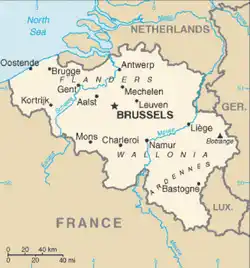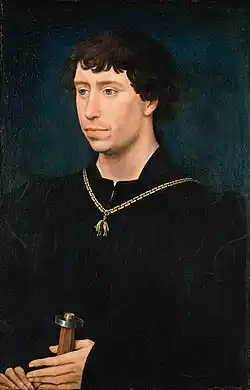
Belgian surnames are the surnames held by people in the country of Belgium in the Low Countries. For what is a relatively small country by European standards, Belgium has a very complex lingual, and thus surname, landscape. There are, for instance, three major official languages here, Dutch, French and German, while there are a great many other more minor official and recognized tongues spoken in some communities and as second and third languages, notably Walloon, Luxembourgish, Flemish and Brabantian. This reflects the country’s torturous history, which has involved domination at one point or another by the French, Burgundians, Spanish and Austrians in late medieval and early modern times. All of this is reflected today in the varied surname landscape of the small nation.
History of Belgian surnamesHistory of Belgian surnames

In order to fully understand how Belgian surnames have developed one has to have an appreciation of the manner in which the region now corresponding to Belgium has passed between different ruling powers over the centuries. The country of Belgium itself has only existed for a little less than 200 years, having been established following the Belgian Revolution of 1830. More broadly the name Belgium derives from Belgica, the Roman name for a region dominated by the Belgae tribes in ancient tribes. This uniformity aside, Belgium has been deeply divided throughout its history and this is reflected in its politics, lingual landscape and surnames today.[1]
As noted, the region was conquered and ruled by the Romans from the first century BCE onwards. Thereafter it formed part of several medieval states, notably being part of Charlemagne’s Carolingian Empire in the Early Middle Ages. By the time that surnames were beginning to emerge in Europe during the High Middle Ages, the region approximating to Belgium today was divided into numerous principalities such as the counties of Flanders, Brabant and Hainaut. Then in the fourteenth and fifteenth centuries these were conquered by the Burgundians of eastern France.[2]

When the Duchy of Burgundy ceased to exist upon the death of Charles the Bold in 1477, his extensive territories in the Low Countries, covering virtually all of modern-day Belgium, Luxembourg and the Netherlands, passed to the Austrian House of Habsburg. From there they passed into Spanish control owing to a royal marriage and so became known as the Spanish Netherlands. While the northern provinces rebelled in the late 1560s from Spanish rule and formed themselves into the Dutch Republic, the southern provinces in what is now Belgium, remained under Spanish control. From there they passed later back to the Austrian branch of the Habsburgs in the early eighteenth century following the War of the Spanish Succession and remained largely under Austrian rule until the time of the French Revolution when they were conquered by the French in the mid-1790s. Independence, as we have seen, came in 1830.[3]
This somewhat convoluted political history of Belgium is relevant for understanding the nature of Belgian surnames. Because of the manner in which the provinces of Belgium were pulled to-and-fro by various powers over the centuries, different languages and dialects became dominant in different parts of the country. Specifically, French is dominant in the south and west of Belgium and Flemish Dutch is dominant in the north and east. German is spoken in a small pocket of the far east and a number of other regional dialects such as Walloon, Flemish and Luxembourgish have also had an impact on the surname landscape. What all of this means is that the surnames which a person will encounter in a northern Belgian city like Antwerp are significantly different to those that predominate in places like Namur and Charleroi in the southern half of the country.[4]
Belgian naming conventionsBelgian naming conventions
Generally speaking, Belgian surnames in the north of the country are predominantly of Dutch origin. This reflects the proximity of these northern provinces to the Dutch Republic over the centuries and also how these regions were on the frontlines of the Eighty Years’ War between the Dutch Republic and the Spanish between 1568 and 1648.[5] Conversely, one will largely find French surnames to dominate in the more southerly and westerly parts of Belgium adjoining France itself. To some extent this is owing to French efforts to gain influence in this part of the Spanish Netherlands during the long reign of King Louis XIV, who waged several wars to conquer territory here in the second half of the seventeenth century.[6] However, perhaps the greatest explanation for these naming conventions is that Belgium simply did not emerge as a unified nation state until 1830. Without a centralized government to impose a single vernacular language, each region simply retained its own regional lingual and cultural identity and with it distinct surname traditions.
Most popular Belgian surnamesMost popular Belgian surnames
The most popular surnames in the north of Belgium, where Dutch predominates, are:
- Peeters – The most common surname in all of Belgium, being a patronymic indicating an ancestor was named Peter.
- Janssens – Another patronymic surname meaning ‘son of Jan’.
- Maes – The third most common surname in Belgium.
- Mertens – Another very common patronymic surname, transliterating as ‘son of Martin’.[7]
Some of the most common surnames in the south of Belgium, of French origin, are:
- Lejeune – A surname which emerged as a way of describing the younger member of a group of siblings.
- Lambert – This may be an occupational surname indicating an ancestor was a shepherd.
- Dubois – A common topographical surname in southern Belgium, indicating somebody hailed from a wooded region.
- Renard – This Walloon name has a mix of French and Germanic influences and means something akin to ‘strong counsel’, plausibly indicating that an ancestor was an advisor of sorts to a ruler.[8]
Famous BelgiansFamous Belgians

- Jan van Eyck – An artist from Bruges who was arguably the progenitor of the Northern Renaissance, his work had an immense influence on the development of Northern European painting in the fifteenth and sixteenth centuries.[9]
- George Lamaitre – This Belgian with a surname which is distinctly French-Belgian hailed from Charleroi in the south of the country. A Catholic theologian, mathematician and physicist, he was one of the first individuals to propose the Big Bang Theory.[10]
- Jean-Claude Van Damme – A world famous martial artist and actor from a suburb of Brussels who starred in some of the biggest action films of the 1980s and 1990s. His surname is a Dutch patronymic one.[11]
- Elise Mertens – A Belgian tennis player who has one of the most common Belgian surnames of all.[12]
See alsoSee also
- Belgium
- Belgian genealogy
- Dutch surnames
- French surnames
- German surnames
- French Canadian surnames
- Afrikaans surnames
- Silesian surnames
- Viking surnames
- Canadian surnames
- New Zealand surnames
- American surnames
- Alsatian surnames
- Arabic surnames
- Polish surnames
- Italian surnames
- Ashkenazi Jewish surnames
- Turkish surnames
- Russian surnames
- Ukrainian surnames
- Romanian surnames
Explore more about Belgian surnamesExplore more about Belgian surnames
- Belgium Birth Notices record collection on MyHeritage
- Belgium Marriage Notices record collection on MyHeritage
- Belgium Death Notices record collection on MyHeritage
- Belgium, Population Registers record collection on MyHeritage
- Belgium, Civil Registration, 1795-1910 record collection on MyHeritage
- Black, Yellow, Red: Find Your Belgian Ancestors! at Legacy Family Tree Webinars
- Beneluxury Archives! How to get the best out of Belgian, Dutch and Lux archives online at Legacy Family Tree Webinars
References
- ↑ https://www.britannica.com/place/Belgica-ancient-province-Europe
- ↑ https://www.brusselstimes.com/35179/when-belgium-was-called-burgundy
- ↑ Jane C. Judge, The United States of Belgium: The Story of the First Belgian Revolution (Leuven, 2018).
- ↑ Roland Willemyns, ‘The Dutch-French language border in Belgium’, in Journal of Multilingual and Multicultural Development, Vol. 1, Nos 1–2 (March, 2010), pp. 36–49.
- ↑ https://www.worldhistory.org/Eighty_Years%27_War/
- ↑ https://opil.ouplaw.com/page/696
- ↑ https://surnam.es/belgium
- ↑ https://forebears.io/belgium/walloon-region/li%C3%A8ge
- ↑ https://www.metmuseum.org/toah/hd/eyck/hd_eyck.htm
- ↑ https://www.amnh.org/learn-teach/curriculum-collections/cosmic-horizons-book/georges-lemaitre-big-bang
- ↑ https://www.biography.com/actors/jean-claude-van-damme
- ↑ https://en.wikipedia.org/wiki/Elise_Mertens

